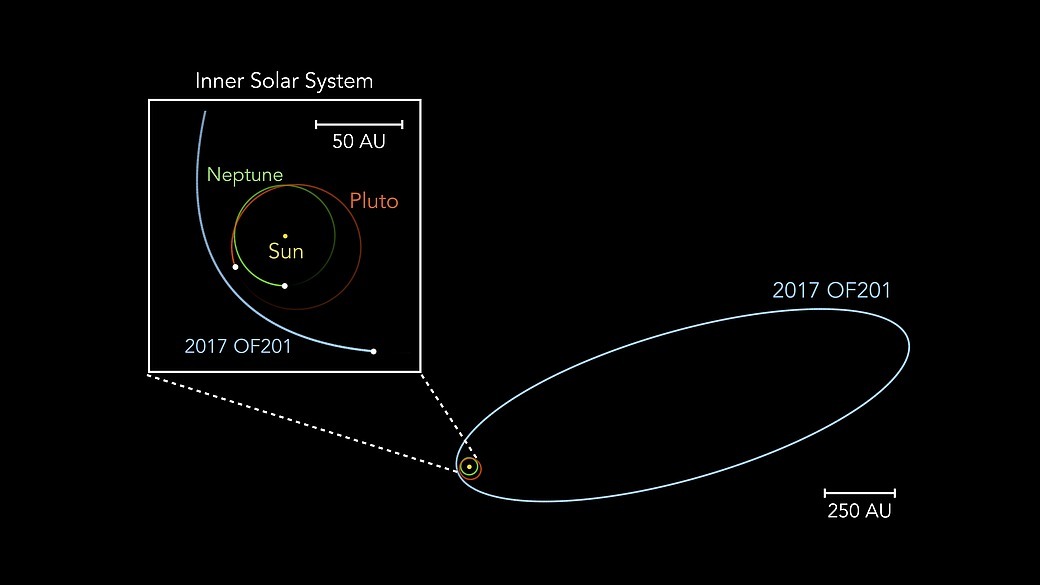Scientists have found evidence of a previously-undetected dwarf planet at the edge of the solar system.
The object, dubbed 2017 OF201, follows an extreme, oblong orbit, taking some 25,000 Earth years to circle the sun. The findings, which were confirmed by the International Astronomical Union’s Minor Planet Center but have not yet been peer reviewed, were published May 21 on the preprint server arXiv.
2017 OF201 is a roughly spherical body about 435 miles (700 kilometers) in diameter, lurking beyond Neptune’s orbit. A team of scientists spotted it while poring through archival data from the Blanco telescope in Chile and the Canada-France-Hawaii telescope based in Hawaii. The researchers tracked the object’s motion across 19 sets of images spanning seven years.
At its closest, the dwarf planet orbits at nearly 45 AU, or 45 times the distance from Earth to the sun — a similar distance as its fellow dwarf planet Pluto. Based on the newfound object’s trajectory, the scientists estimate its last close pass to the sun was in 1930, the same year Pluto was discovered. It’s now twice as far away and rocketing off even further into space. At its farthest point, 2017 OF201 will be a whopping 1,600 AU before starting its journey back inward.
This oblong orbit hints at complex gravitational interactions, both with Neptune and with the pull of the Milky Way‘s gravity.
“There may have been more than one step in its migration,” study co-author Sihao Cheng, an astrophysicist at the Institute for Advanced Study in Princeton, New Jersey, said in a statement. “It’s possible that this object was first ejected to the Oort cloud, the most distant region in our solar system, which is home to many comets, and then sent back.”
Related: Planet Nine: Is the search for this elusive world nearly over?

Because it’s so difficult to spot solar system objects this far away, it’s possible 2017 OF201 isn’t the only dwarf planet waiting to be discovered.
“2017 OF201 spends only 1% of its orbital time close enough to us to be detectable,” Cheng said. “The presence of this single object suggests that there could be another hundred or so other objects with similar orbit and size; they are just too far away to be detectable now.”
The newly-discovered object could also challenge theories of Planet 9, a proposed but unobserved large planet orbiting billions of miles beyond Neptune. Some scientists have proposed the influence of Planet 9’s gravity to explain the clustered orbits of some trans-Neptunian objects. But 2017 OF201 doesn’t fit neatly into this observed pattern, and the researchers suggest that the gravitational pull of Planet 9 — if it exists — would knock 2017 OF201 out of the solar system fairly quickly. Further observations will be needed to better understand these possible interactions, the team wrote in the study.
“Even though advances in telescopes have enabled us to explore distant parts of the universe, there is still a great deal to discover about our own solar system,” Cheng said.
